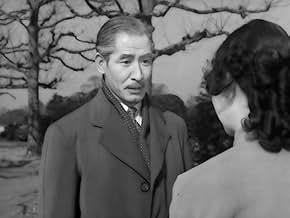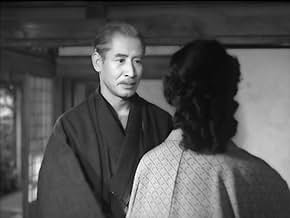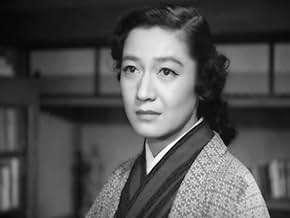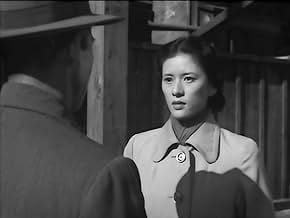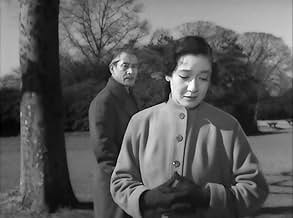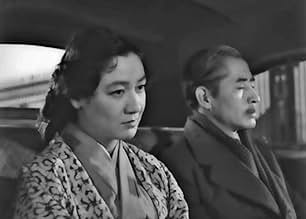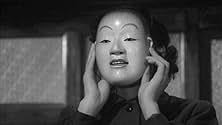Ajouter une intrigue dans votre langueAn ingratiating bride develops warm ties to her father-in-law while her cold husband blithely slights her for another woman.An ingratiating bride develops warm ties to her father-in-law while her cold husband blithely slights her for another woman.An ingratiating bride develops warm ties to her father-in-law while her cold husband blithely slights her for another woman.
- Réalisation
- Scénario
- Casting principal
- Récompenses
- 1 victoire et 1 nomination au total
Avis à la une
Out of the blue, Shingo and Yasuko's daughter Fusako (Chieko Nakakita) leaves her husband and arrives at Shingo's home with her two children. Shingo investigates and finds the address of Shuichi's lover. Meanwhile Kikuko goes to the hospital and Shingo learns that she was pregnant but decided to abort her child.
"Yama no oto" is a movie about forbidden love based on the novel of Yasumari Kawabata and directed by Mikio Naruse that uses the favorite theme of Ozu – the family drama - and similar locations. The story is based on the patriarch Shingo, a man that has married his wife without loving her but also respected her along their lives. He feels a forbidden love with his sister-in-law Kikuko, a woman that is apparently submissive working as a servant at home, but strong enough to abort her child to avoid keeping her loveless marriage with her husband. Fusako is Shingo's estranged daughter that is also strong enough to leave her husband and move with her children to her parents' home. This women behavior is unusual in Japanese movies from these years. My vote is eight.
Title (Brazil): "O Som da Montanha" ("The Sound of the Mountain")
I can't help but wonder if this movie was considered quite forward or daring or maybe even racy for its release date of 1954. If you're familiar with Japanese culture around this time, you know that tradition ruled and emotions and personal issues were skirted around and rarely confronted head on. The norm was to internalize everything. This movie actually does the opposite, and it does it expertly.
Well acted. Directed with perfection. Poignant dialogue. And composer Ichiro Saito nails the music score with a wonderfully romantic quality. My only critique is the editing is a bit choppy in spots, but it doesn't detract from the overall genius of the film.
One of the things altered relative to Yasunari Kawabata's novel is the elderly man's mental state, which in this adaptation isn't declining with age, with accompanying melancholy. Another is his relationship with his daughter-in-law; clearly they have a connection in the film, but it's based on simple kindness and admiration, and erotic feelings on his part aren't involved. The result is a character who is on the surface a decent old man, still married to his own wife despite his own indiscretions and having been more attracted to her older sister long ago. He's not particularly effective in reining in his son, however, and he doesn't give his own daughter enough affection or attention, reserving those things for his daughter-in-law. In that sense he's failed in life.
As in many of her films, Setsuko Hara is the brightest light in the cast. Her character is simple, kind, and filial (derisively referred to as "childlike" by her husband), but shows a toughness in the actions she takes. Hara brings out the emotions very well, and while the ending gets a little melodramatic, it has power. Overall, just a very well done, well-paced film from Mikio Naruse.
Le saviez-vous
- AnecdotesSô Yamamura, who portrays Shingo the father, was actually one year younger than Ken Uehara, who portrayed his son Shuichi.
- Citations
Shingo Ogata: My mind is getting very foggy these days. Even when I look at a sunflower, it reminds me of what's in my head. If only what's in my head were as grand as that sunflower. I wish there was a way to take it off and have it cleaned or repaired. That's what I was thinking on the way home.
Kikuko Ogata: [laughs] Oh, father-in-law.
Shingo Ogata: Just take off my head and take it to the hospital like taking laundry to the cleaners.
Kikuko Ogata: That's very funny.
Shingo Ogata: In other words, while the mind is getting cleaned or repaired, the body will rest in the meantime.
Kikuko Ogata: You're too much, father-in-law.
Shingo Ogata: The body will have a good rest, without even dreaming.
Meilleurs choix
Détails
- Date de sortie
- Pays d’origine
- Langue
- Aussi connu sous le nom de
- Sound of the Mountain
- Société de production
- Voir plus de crédits d'entreprise sur IMDbPro
- Durée
- 1h 35min(95 min)
- Couleur
- Mixage
- Rapport de forme
- 1.37 : 1

